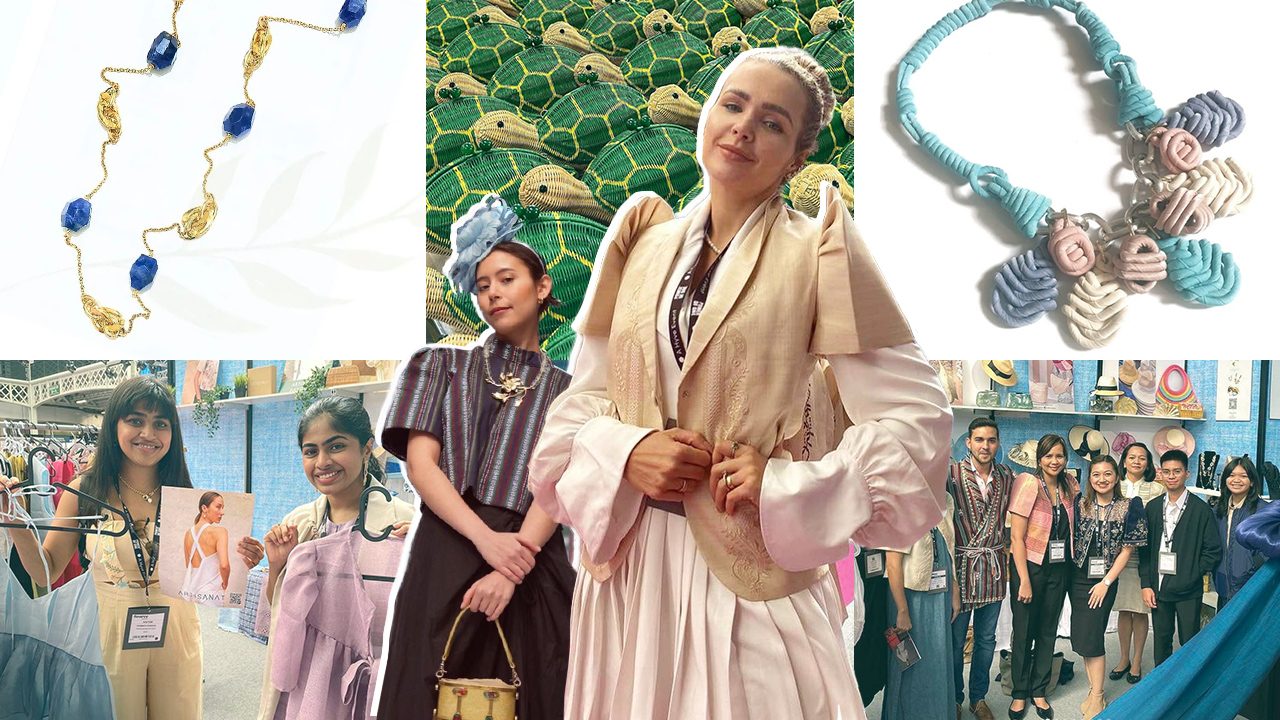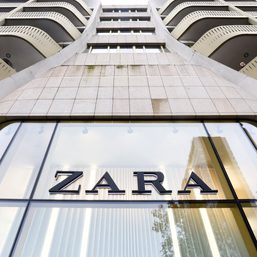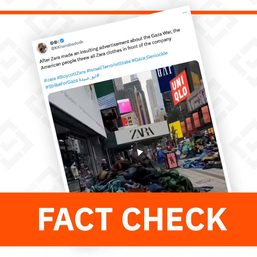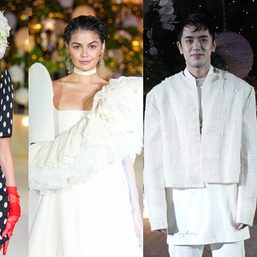SUMMARY
This is AI generated summarization, which may have errors. For context, always refer to the full article.

For the first time, Filipino fashion designers and brands participated in Source Fashion, a trade show that links big-name retailers from the United Kingdom to sustainable manufacturers from all over the world. But it’s not all business – fun events like conferences on sustainable fashion and runway shows kept visitors in the know about the latest green trends.
Source Fashion ran from July 16 to 18 at the iconic Olympia Exhibition Hall in London. Source Fashion is UK’s newest sustainable sourcing show, and this edition is the third run after its 2020 relaunch.
Fairs and More, a subsidiary of the European Chamber of Commerce in the Philippines (ECCP), is the main organizer of the Philippine delegation. Dawn Cabigon of Fairs and More tells Rappler, “It’s been a hectic three days for the Philippine team, with a lot of excitement from visitors and buyers. People tell us it’s the first time they see our products in the show. In the UK, it’s not easy to find Filipino materials or products, so people look forward to visiting our booth.”
The bright and colorful Philippine pavilion showcased our rich cultural heritage and creative spirit. On display were handcrafted modern ternos from Lin-ay by Binky Pitogo, everyday staples in natural fibers by Artisanat Handmade, wicker bags and abaca fascinators by Orient Meadow, bags and accessories from upcycled plastic by Virtucio, statement necklaces and earrings by zero-waste brand Piesa, and handmade jewelry set with precious gems by Mjorian.
Source Fashion pushes for diversity in the fashion supply chain, inviting more countries to the show each year. “We are extremely excited to be welcoming manufacturers, designers, artisans, and producers from new regions including Ethiopia and the Philippines to the July show,” said Suzanne Ellingham of Source Fashion, in a statement.
Thanks to the UK’s new bilateral trading scheme exclusive to developing countries, businesses from the Philippines can take advantage of tariff-free and quota-free exports for certain products. This generous scheme is a real game changer that gives small to medium enterprises (SMEs) the opportunity to sell their products abroad.
The trading agreement is another reason why Filipino designers and manufacturers were encouraged to participate in the show. Pietro Lessi of Source Fashion spoke to Rappler and said that the trade show has grown exponentially this year, with over 300 exhibitors versus only 80 last year.
“We have a growing visitor base and we’re expecting it to be even bigger next season. It’s a great opportunity for suppliers to meet the buyers and key decision-makers in the UK retail sector.” He said that buyers included some of the UK’s biggest retail brands such as Burberry, Vivienne Westwood, Prada, Fila UK, Harrods, Selfridges, Lulu Guinness, and ASOS.
Sourcing sustainably from the Philippines
The Philippines has a rich history of textile manufacturing, craftsmanship, and weaving that dates back centuries. We produce local plant-based raw materials like abaca and pineapple fiber, considered to be sustainable fibers. The Philippines is the largest abaca producer in the world, which the United Nations considers to be a “Future Fiber.”
Our country is also home to many sustainable fashion businesses. Aside from pushing for eco-friendly practices like upcycling and circularity, many of these brands also work with vulnerable communities, providing them with a source of livelihood and purpose.
As fast fashion’s negative impact on climate change ceases to be a secret, more consumers demand sustainable alternatives from shops. The buyers at Source Fashion are taking small steps towards change by sourcing their materials responsibly.
The Filipino brands underwent a rigorous screening process to be accepted at the show. First, the products have to be in demand in the UK. Sustainability is another priority. Source Fashion vets the company’s manufacturing processes, labor practices, the story behind each brand, and how they are helping their local community.
Binky Pitogo, who specializes in creating Filipiniana pieces for modern women, said, “Lin-ay has always been committed to empowering small communities behind every piece. Creating clothes is a great way to showcase our art and at the same time, sustain our rich culture. I believe that Filipiniana fashion suits everyone and has the ability to empower anyone who wears it.”
The trade show experience
Joining international trade fairs is a bold step for SMEs. It demands time and resources, but the benefits are potentially substantial. Presenting products on a global stage can open a lot of connections and opportunities.
Pitogo said that it was a busy three months leading up to the show.
“We had to process our visas while at the same time launching a new collection and preparing our marketing materials. Another challenge for us was making sure that our production would go unhampered while we were away for the trip.”
Marigrace Reaño, owner and designer of Mjorian, isn’t a stranger to international trade shows, and she believes that joining Source Fashion is one of the best decisions she’s made for her business.
“Betting your resources is always part of the game, and joining shows abroad isn’t easy. But there is so much potential in the UK and we saw how retailers were so interested to have traditional Filipino crafts in their stores. It would be great if SMEs like mine could have support from the government in any way so more entrepreneurs can show their crafts abroad.”
So, how does an exhibitor measure their success at trade shows? Lessi emphasizes that concluding the sourcing process can take months to organize, so exhibitors have to be patient when it comes to sealing the deal. “Sourcing deals don’t just happen on the spot. For exhibitors, the expectation shouldn’t be “How many deals can I make today?” Instead, focus on the quality of the connections and relationships you build at the market. Getting contracts will naturally follow.”
Cabigon is proud that the Filipino brands at Source Fashion are doing their part in their own way when it comes to improving the fashion supply chain – creating art from trash, making clothes from natural fibers, and giving jobs to underprivileged communities.
Sustainable fashion is the future. Each year, Europe, the US, and the UK are putting forward new proposals and laws that require the fashion industry to be more just and responsible. For Filipino designers and manufacturers in this niche, this can be the gateway toward a larger presence in the global marketplace. – Rappler.com
Add a comment
How does this make you feel?




![[PODCAST] Teach Me, Senpai, E6: Thrifting and vintage clothing with Season Pass](https://www.rappler.com/tachyon/2023/11/teach-me-senpai-ls-guest.jpg?resize=257%2C257&crop=460px%2C0px%2C1080px%2C1080px)
There are no comments yet. Add your comment to start the conversation.